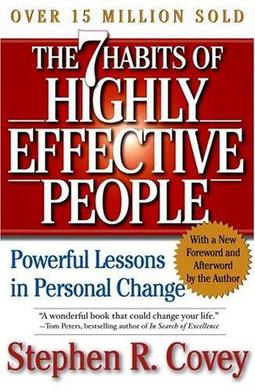By Stephen Covey (1989)
Pages: 380, Final verdict: Must-read
What’s the magic secret to being effective?
This is the question that millions of people ask, especially during this time of the year, as they try to start the New Year with new habits that aim to change their lives for the better.
And, actually, the trick is simply the word Habit; good habits to be precise. This is the message that the author Steven Covey, shares in his book The 7 Habits of Highly Effective People, that sold more than 20 million copies worldwide and was named the #1 Most Influential Business Book of the Twentieth Century. But which are the seven habits?
Inside Out Approach And Private Victories
Every day we are flooded with hundreds of books on “How to get rich quick” or “How to be successful in 60 days” and most of them teach us that success has become a function of personality, of public image or of behaviours and skills, and that by mastering these techniques we will be successful.
Although these skills are important in our everyday life, their absence is not the root cause of our problems, or of our ineffectiveness. The problem begins with the existing paradigm, the perception that these skills solely by themselves will enable us to be successful and not our Character. To be effective, the author defends we need to start with ourselves – The Inside Out Approach - and to adopt the Principle Centered Paradigm. This paradigm defends that having character oriented principles is like having a compass to govern our lives, so we can always know the right direction.
“What we are communicates far more eloquently than anything we say or do” – Steven Covey
The seven habits are divided into 2 main categories: Private Victories and Public Victories. The fact Public Victories comes after Private Victories is in line with the Inside-Out approach, by implying that one must first be an effective individual, in order to be effective in his/her relationships. The Private Victories, Habits 1, 2 and 3 will help us to be more effective as isolated individuals, being Independent. But because we live in society, most of our successes depend on whether we are effective in our relationships or not. The Habits 4, 5 and 6 will help us increase the success of our relationships and therefore let us achieve an Interdependent State.
Achieving Independence
To achieve Independence, one must follows the habits of the Private Victories, which are:
-
1. Be Proactive
-
We are responsible for our success. “I am what I am today because of the choices I made yesterday.”
-
Circle of Influence/ Circle of Concern - In our lives there are things that concern us that we can control and others that we can’t control. By focusing on the things we have impact on, our Circle of Influence, we can use our energy more effectively and actually have an impact and change the course of our lives.
-
Ones of the examples presented in the book related to this habit is about Victor Frankl’s heart-warming story in the Nazi camps and how adopting a proactive mindset starts a real paradigm shift.
-
2. Start with the End in Mind
-
Start with a clear understanding of your destination - so you know if you are walking in the right direction. “Managing is doing the things right. Leadership is doing the right things.”
-
Visualize It before you do it. “… all great performers are visualizers, they see it, they feel it, they experience before they actually do it. They begin with the end in mind”
-
3. Put First Things First
-
Focus – When Bill Gates and Warrant Buffet first met at a dinner they were asked the same question, “what is most important factor for success?” And simultaneously they answered “Focus”. It speaks for itself about the importance of focusing on the right things.
-
Spend time on Important and Not Urgent activities (so-called Quadrant 2 activities).
“Effective people are not problem minded, they are opportunity minded. They feed opportunities and starve problems.” – Peter Drucker
Public Victories and Sharpening the Saw
After achieving an independent state, where we are responsible, we design and we execute our own path, we need to be able to get the most of our relationships. Therefore, Habit 4, 5 and 6 aim at producing long-term profitable relationships. Whether it’s within our family or with our colleagues, relationships have a major part in our life and effectively tackling them is critical to reaching our goals. In order to achieve the Interdependent state the following habits must be practiced:
- 4. Think Win-Win
- Maturity. To think win-win we need to be courageous to believe that we will achieve our goals, and considerate to think that the other part will also fully benefit from the deal. “Maturity is the balance between courage and consideration.”
- Abundance Mentality: the paradigm that there is plenty out there for everyone. People with this mindset know that by thinking win-win and working together, they will create much more value than by having a Win-Loose mentality.
- 5. Seek First to Understand, then to be understood
- Empathic listening – Truly understanding the other’s concerns and paradigms will make it much easier for us to share our message. By listening empathically to the other person, we will reflect their feelings and be much more willing to understand our point of view.
- 6. Synergize
- 1+ 1 + 1 = 25 - The Whole is greater than the sum of its parts. A good example of the synergy effect is the football trio that has won 25 titles in the last decade. Messi – Iniesta – Xavi, together have bullied almost all major European defensive players and won dozen of titles. However, by himself, Messi hasn’t won any relevant title for his national team.
The last habit is 7. Sharpen the Saw. It’s the continuous improvement habit that we need to practice on a daily basis. This habit has an impact on all previous habits and we need to practice it on all 4 dimensions:
- Physical – maintain and improve our body
- Spiritual – promote leadership capabilities
- Mental – increase knowledge and skills
- Social and Emotional – improve relationships
Bottom Line
All these topics sound like clichés, that we have heard one thousand times. However, being reminded of them, one by one, with real examples and in a structured way makes us understand the importance of practicing these habits in a fully committed way.
One of the characteristics of this book is that it has many practical examples of how to implement these habits. In a way, it is good if you also use this as an exercise book, but if you are only are trying to understand the message flow of the book it sometimes makes it difficult to keep track of previous thoughts.
Nevertheless, I fully recommend the reading of this book as starting point of the continuous path of questioning our own paradigms, and living a more effective life, according to our own priorities.
Further learning:
- Buy the book online.
- StephenCovey.com
- The 8th habit: From Effectiveness to Greatness – Discover the 8th Habit and how to be a more effective leader in all parts of your life.
- The 3rd Alternative – Learn how to solve conflicts and create synergistic solutions by building 3rd alternatives.
- Forbes - The only thing you need to remember about The 7 Habits of Highly Effective People
This post was written by Francisco Alves, a guest author at BetaGlyph. You can find out more about the author at betaglyph.com/about.



